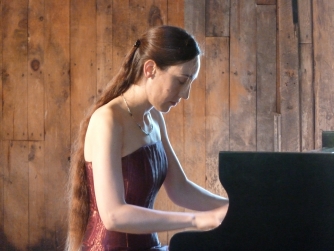Details
St Mary's Church
St Mary's Road
Ealing
London
W5 5RH
England
Programme
Doménico Scarlatti – Keyboard Sonata in E major, K.380
Maurice Ravel – Miroirs: Alborada del gracioso
Isaac Albéniz – Iberia: Evocation, El Corpus en Sevilla, Triana
Claude Debussy – Preludes, Book II: La Puerta del Vino
Antonio Soler – Keyboard Sonata in D major, R.84
Performers
Emilie Capulet – piano
Other concerts in this Series (+)
Programme Note
Like Bach and Handel, Domenico Scarlatti was born in 1685. It was his move to Portugal in 1719 which unleashed his true contribution to Western musical culture in the form of 555 keyboard sonatas. Whereas Scarlatti's income came from private patrons, Soler was a church administrator who wrote music as part of that service; masses and motets for God, and also concertos, quintets, pieces for solo organ and 150 sonatas for solo keyboard.
La Puerta del Vino (The Gate of WIne) is one of Debussy's many invocations of Spain, where he describes Spanish life and passionate temperament based on a postcard he had received of the Moorish gate by the Alhambra Palace in Granada.
Albeniz wrote operas, zarzuelas, concertos and many volumes of salon pieces for solo piano; his real legacy, however, is the collection of 12 pieces which make up Iberia. Evocacion is an impressionistic reminiscence of the old North Spain, combining elements of the Andalusian fandango and the northern Spanish jota. El Corpus en Sevilla describes the Corpus Christi procession in Seville; a processional march yields to a mournful saeta over flamenco guitars. Triana, the sixth piece in Iberia, describes the gypsy quarter of Seville where music (and everything else) are felt quite differently.
Ravel was one of many composers to orchestrat Albeniz' Iberia. He was born a few miles from the Spanish border and could write the most evocative music of Spain from the confines of a Paris appartment. Alborada del gracioso is the fourth piece from Ravel's suite Miroirs; Alborada literally means dawn but this is the 'dawn of the buffoon', where a grotesque lover prances to the strumming of guitars. The din gathers and Ravel deploys all manner of wickedly demanding piano technique - double glissandi and repeated notes in particular - for the close of this erotic frenzy.

 Your events at Classical Events
Your events at Classical Events

